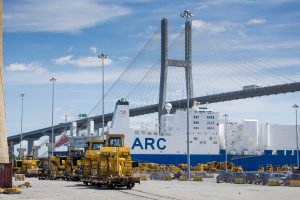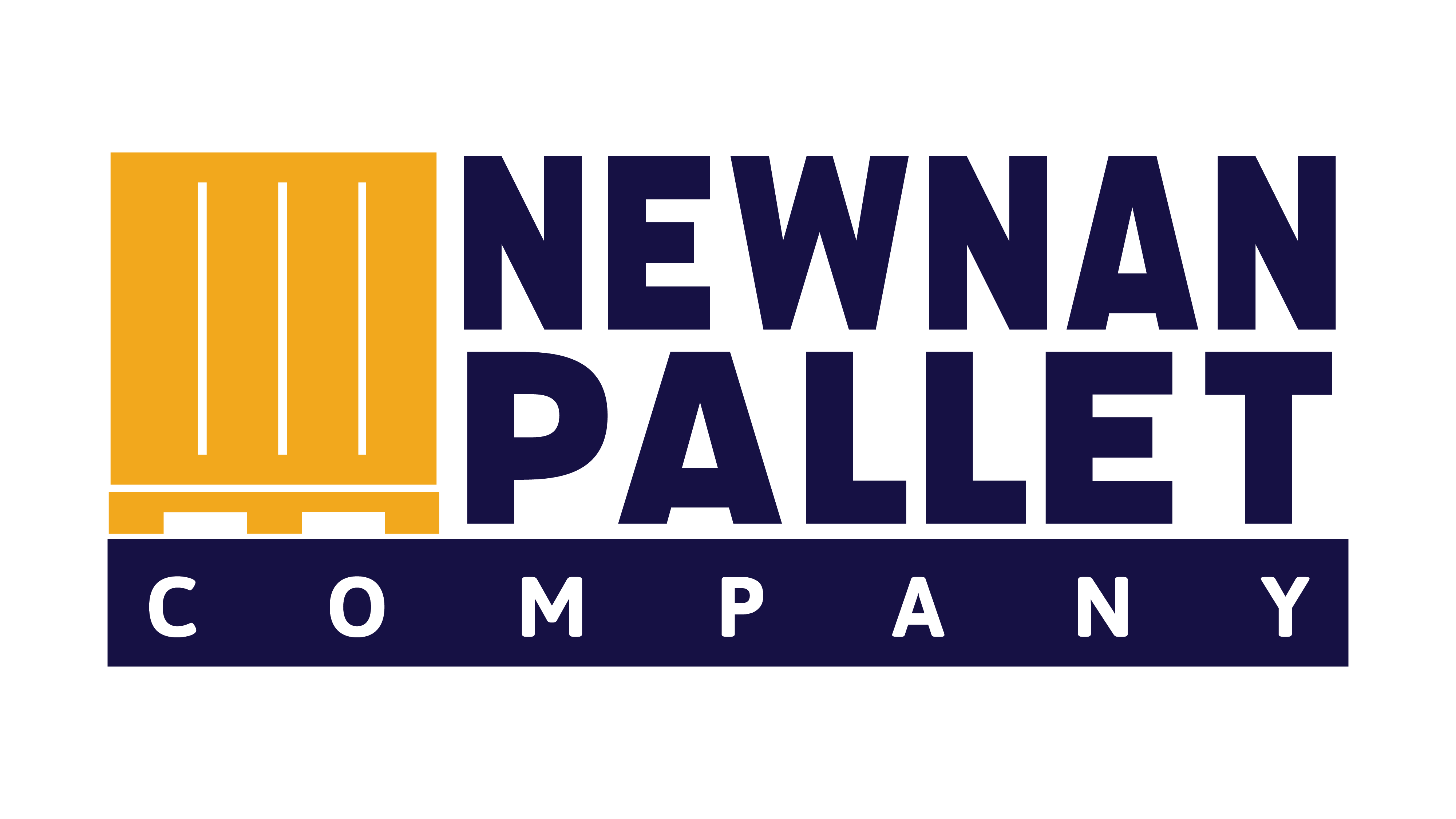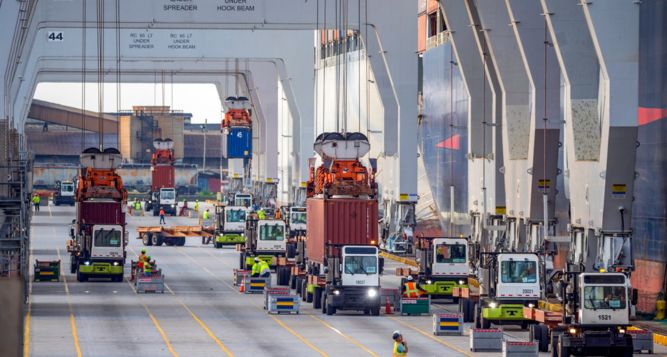In recent years, Georgia has climbed to the top as the number one state in the country for conducting business. The state boasts unparalleled accessibility, ranking #1 in the U.S. for supply chain and logistics hubs, according to the Area Development Magazine.
In fact, in the last fiscal year, 360 companies combined to invest a whopping $4.3 billion in the state. But what is compelling corporations, factories and food distributors alike to bring their businesses to Georgia? The answer lies in three simple syllables: logistics.
Talking Logistics
When you own a business, you know that logistics is a major part of successful operations–your products have to get to your customer quickly, reliably, and in mint condition if you want them to pay the invoice. Thus, timing, costs, risk reduction, and customer service must come together and work as seamlessly as possible, including transportation of inbound supplies and materials to outbound finished product. From coordinating the delivery of parts for product creation to shipping your goods to your customer, efficient transportation is crucial to maintaining a smooth fulfillment process.
Whether you’re shipping domestically or exporting around the globe, accessibility is crucial when dealing in matters of transport. Providing people outside your community–in other cities, states, and even countries–with your product is key in scaling-up for your business’s growth and success.
Access to major transportation hubs can significantly speed up connections, increase options, and thus reduce costs; hence, Georgia’s popularity. The state has carefully constructed an accessibility archetype, optimizing its infrastructure to support all shipping methods to make life easier for businesses across industries.

The Transportation Trifecta
Luckily for companies in the Peach State, state and local governments have focused resources on improving every transportation method possible.
Georgia’s transportation organizations are committed to continued enhancement of the state’s roadways. The current border-to-border system within Georgia is a robust 4-lane grid network of freight highways that connects the entire state and stands to expand even more in the next decade as the state has approved investments worth nearly $2 billion to upgrade and maintain this impressive roadway system.
Connecting to destinations outside the boundaries of Georgia is made possible by the state’s road infrastructure, which is highly touted for its unrivaled access. Although the state is located in the heart of the southeast, Atlanta is only a two-day truck drive from 80 percent of the country’s GDP, making it a hotbed for land transport. The city trails only Chicago as a major hub where freight and shipping containers move from trains to trucks and vice versa, making Atlanta the second largest inland port city in the country.
Atlanta’s tradition of excellence in transportation began more than a century ago with one of the country’s earliest transport method: railways. The city is serviced by both of the Eastern U.S.’s Class 1 railroads, fed by 24 shortline railroads throughout the state of Georgia. The 2015 Area Development report ranks Georgia third overall in the US for rail accessibility, lending to its unprecedented connectivity, which allows trains to access more rail miles than any other state in the Southeast. Whether your cargo includes intermodal, bulk, automotive or any other type of shipment, Georgia’s railways are a highly-accessible, transport mode.
Rail transport continues to be a mode-of-choice for basic commodities, and intermodal rail shipments number more than 1 million units per month, nationwide. The Center of Innovation for Logistics collects and publishes this data and other industry metrics each month in the Logistics Market Snapshot, including freight rail traffic, intermodal traffic, railroad fuel prices, and railroad employment. The Snapshot is a one-stop-shop for all logistics-related data points, including FTR’s monthly Intermodal Competitiveness Index that indicates how favorable or unfavorable rail is as a transport option for cargo-owning companies. FTR’s recent predictions include that rail will become more competitive as national trucking regulations begin to tighten in the coming months. And Georgia is once again at-the-ready to serve.
But Atlanta isn’t the only shipping center in the state. The Port of Savannah is the fastest growing deepwater container port in the country and second largest port on the east coast behind the Port of New York & New Jersey. With the support of an impressive private sector, Georgia’s General Assembly and governor’s office committed the past decade to making it easier and cheaper for companies to do business here by investing in Savannah’s port.
With their continued involvement, Savannah has become the preferred seaport in the ‘four corner’ strategy for global access, lower costs, and unparalleled customer service, creating the perfect environment for businesses with an international shipping component. The Center likes to say Savannah is where ‘global commerce meets Southern hospitality’. And shippers agree – the compounded annual growth rate of Port of Savannah container volumes has been roughly 9% each year since 2000.
And, according to Colliers International, the vacancy rate for industrial and distribution real estate in the Savannah area was around 2.5% in the last half of 2016. The popularity of Savannah for imports and exports is partly due to its proximity to Atlanta; as the metropolis continues to grow, so will the port.
Atlanta’s Hartsfield-Jackson International airport is the most-traveled airport in the world, getting its record passenger volumes largely from Delta Air Lines, which calls the city its home base. For companies looking to move products quickly, Hartsfield-Jackson delivers; the airport offers nonstop service to 60+ international destinations and is a 2-hour flight from 80 percent of the U.S. population.
The recently opened international terminal is a $1.4 billion testament to Atlanta’s commitment to future global connectivity. Georgia’s unprecedented accessibility to every possible shipping method, from roadways and railways to air and sea, provides business owners with a huge financial benefit; with so many options for transporting goods, market competition drives down the cost, making Georgia a logistics dream-come-true.
The E-commerce Effect
The future of logistics in the state looks bright as well, including the ability to serve the rising popularity of e-commerce. Historically, consumer’s access to goods required a trip to the nearby retail center, big box stores and shopping malls; a customer’s personal automobile was the most popular carrier of freight for the last mile of a product’s commercial life. However, e-commerce has been rapidly growing in recent years, and a third of those orders are coming from mobile phones.
According to the U.S. Census Bureau, Adobe, and comScore, U.S. online sales totaled $91.7 billion for the end-of-year holiday period, up 10.5% from the same period in 2015. Consumers spent $17.1 billion on mobile devices during the 2016 holiday shopping season, up 44.9% from $11.8 billion in mobile sales during holiday 2015. (Source: Adobe, comScore, US Census). As that trend continues upward, more companies will be forced to meet consumers where they want to be met: on their doorsteps.
The popularity of online shopping has brought consumers to expect seamless, timely (and free!) product delivery. Strategically placed distribution centers are essential for serving that type of demand, and all over the country, we’re seeing consumer products begin to flow more and more off the distribution center rack rather than off the shelf at retail shops. As UPS delivery trucks, the postal service, and someday, drones, become the predominant last leg of transportation between a company’s product and consumerist customer, businesses will continue to rely on flawless outbound logistics to get the job done–a task the state of Georgia is once again prepared for success.
Originally written by Jannine Miller, director, Georgia Center of Innovation for Logistics
Looking for a smarter way to manage your pallets? Newnan Pallet Company offers cost-effective and sustainable pallet solutions that keep your business moving. Get in touch with us today and see why companies trust us for their pallet needs!

